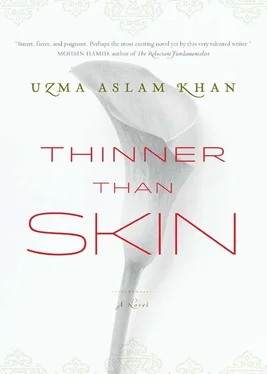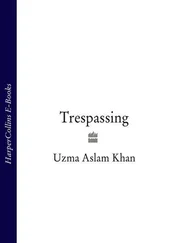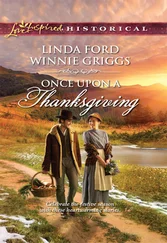“You’re all nuts!” Wes overturned the Scrabble board for me. “How about you and I go back,” he looked at Irfan, “and let these two go on?”
“We had an agreement.” Farhana looked at Wes.
What agreement?
So did we . Irfan looked at me.
“Then it’s decided,” I said, bolting toward the door before Farhana changed her mind, and more agreements could be made.
In our cabin, Farhana’s and mine, Irfan was sullen while unbuttoning his shirt. He said, “You and Farhana could fight your battle back in America.”
“You don’t have to come with us.” It sounded like I was trying to get rid of him, when in fact I knew we needed him.
He knew too. He didn’t bother answering me. Though no one said so, some of us at least seemed to hold to the belief that we all went forward or all went back. We had long ago ceased being mere friends. We were accomplices.
I watched him arrange his shirt on a hanger, then drape his jeans over a chair. Next, a fresh pair of socks, fresh underpants, and a pair of leather shoes. Joggers were only for trekking. He was always the most dapper man I’d known, second only to my father, who polished his shoes every night in slow, deliberate movements that were almost relaxed. The last time I was here, with Irfan’s wife, there was no electricity in any hotel in Naran. To impress Zulekha, he’d taken all our clothes to the one laundry place in town, where the Khan had a coal iron. While the Khan put burning coals in the iron and waited for it to heat before painstakingly smoothening every wrinkle from our shirts and Zulekha’s shalwars, kameezes, and especially her dupattas, Irfan and I stood by patiently, till one of us offered to get the other a boiled egg sprinkled with salt and pepper.
He had his own travel iron now. He was the only one of the three men in the group who shaved daily, keeping his beard clipped just so. There must have been shoe polish somewhere in his bag. Yet, apparently, even his fastidiousness had its limits. Irfan climbed into bed in his underpants without brushing his teeth.
But I smelled soap on him. I couldn’t remember the last time I’d showered.
He checked his cell phone then switched off the lamp on his side of the bed. “We should avoid Kohistan and head northeast, with an armed escort. Everyone is being checked, and I’m not even sure who they’re checking for. You’ve been so busy with your private battle I don’t know if you’ve even noticed the nervousness of people here.”
He was repeating himself. I let him.
“They don’t know who’s who, spies or militants,” he jabbered on. “And who’s working for who — America, Pakistan, or India. Or someone else we don’t even suspect.”
“You seem more nervous than anyone else,” I said. Spies or militants, murderers or lovers, what difference did it make?
“You know Wes called his boss to say his work was delayed because there’d been a bomb blast? He was right. You and Farhana were generating that much smoke.”
I had to laugh at that.
After a while, I said, “I need to ask you something.”
“I’m listening.”
“When you and the girl’s brother came to get us, was Farhana in our boat?”
“Of course.”
“Was she — wet. You know, as if she’d been in the lake?”
I could hear him turn in the dark. “She was shivering, yes. I didn’t look at her that closely. She had to be wrapped in blankets too, but I don’t think she fell in the lake. Her temperature didn’t drop like yours. Why?”
“Do you think she dived?”
“To look for the girl? What would have been the point? She could never have saved her. Now, if I’d been on your boat.”
I decided not to argue with him.
He reached over in the dark and scratched my head. “Sleep.”
He was taking my betrayal of him remarkably well.
“Tell me more about her,” I ventured.
“Who?”
“The girl. Her family.”
I heard him shift again. “No one knows where they came from. Even they can only agree with each other on three things. They were always wanderers. They were once horsemen. They are still considered outsiders.”
I listened to Irfan in the dark, grateful for the distraction. He spoke for a long time, uninterrupted, and after he fell asleep, I pulled on my jeans, laced up my shoes.
“Stay away from owls,” he mumbled into his pillow, as I shut the door behind me.
I walked repeating his words in my head.
Eventually, a few tribes had lost their horses and, to some extent, their wandering lifestyle, while others retained both. On four legs or two, Gujjars had always been pushed out of grazing grounds by those who came before or after. Yet they’d managed to keep grazing in this valley, and in parts of Kashmir. And somehow, through time and distance, they kept in intimate contact with each other.
I knew where my legs were carrying me. It would be my last night in Kaghan, perhaps ever. I believed myself prepared for the ghosts I’d find. My head was clear. I felt calm, the way I normally felt on my nightly walks, the way I hadn’t felt since the accident — no, I’d stop calling it that. I would call it a murder.
I reached the graves. There they were again, the ones engraved with owls, ducks, and horses. I shone my flashlight on the headstone that had caught my attention earlier, the one of three horses pulling a chariot, necks curved upward, toward the sky. Now I noticed others with chariot wheels, the wheels perhaps symbols of permanence, representing those tribes that had partially settled. And perhaps the ducks joined with floral wreaths represented the harmony between the different tribes, those who remained nomadic and those who became sedentary. No one had told me this; I was only guessing. But I did know that the two needed each other, those who moved and those who stayed. They formed a political system of co-tribes, together deciding on the limits of their pastures and forming ways of guarding against encroaching tribes, such as the Sawati Afghans, with whom the Gujjars of this valley had tense relations. The more stable group was the protector. The more nomadic group was the producer. And the two formed alliances through marriage.
Such as Maryam’s.
Irfan believed that Maryam’s family was from the protector group. They’d become laborers, merchants, and soldiers, with some migrating south to the cities, others to the town of Naran, perhaps like the jeweler at whose shop I’d been overcharged for topaz. In contrast, the family of Maryam’s husband, Suleiman, were the producers. They continued to roam the Kaghan Valley as grazers, with little engagement in the world of commerce or defense. And so, while his family kept hers fed, her family kept his alive.
“They have a private system of justice,” Irfan had said. “Nothing to do with the state. The state couldn’t care less about them.” After a few moments, he’d added, “They have no land, no nation. If you’d killed a child of the nation, well, you already know.”
I’d listened in the dark, the air in the cabin slowly diminishing.
“It’s her family, who are less low to the ground, that demanded compensation for Kiran’s death,” he’d continued. “His family are lowly herders. They asked for nothing.”
I hadn’t asked what the compensation was. It would doubtless involve money, putting me twice in Irfan’s debt. I still hadn’t returned my rent money.
Now I turned my attention back to the headstone with the three horses. I was not unaware of the presence at my back. I had heard footsteps. I had also heard whispers. I was not imagining it. I did not shine my flashlight behind me, but straight ahead, at the grave with the horses.
The arc of those necks arrested me. Three crescents on a rock, perfectly aligned. Together, they exposed to the world the most vulnerable part of themselves, inviting judgment. No, seeking it. It seemed to me, as I crouched in the dark, my hand shaking, the light-beam fading (why hadn’t I changed the battery?), that the owls on the headstones were the jury. In contrast, the ducks, carved in profile (unlike the owls, who stared full in your face) with wings beating impatiently, played the role of neutral spectators. Their indifference was not unkind; they might represent absolutely nothing other than the random strokes of a playful mind and a long-forgotten hand. Or else, if one had been placed there on purpose, in all his flapping, noiseless glory as he looked down the barrel of those arcing necks, sleek and defenseless, surely it was to serve as a gentle reminder of a need for mercy.
Читать дальше












